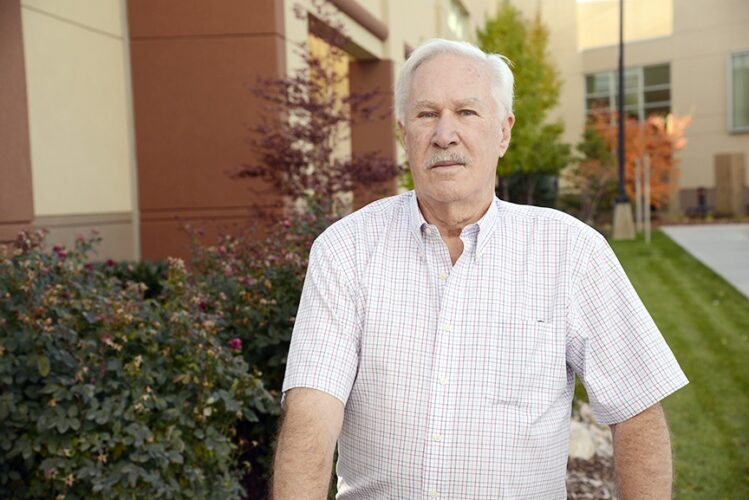Heart scan can help prevent unexpected incidents

This photo shows heart scan recipient Lawrence Meckley. (Craig Bielik, Ogden Regional Medical Center)
Lawrence Meckley said a $69 test probably saved his life.
Two years ago, Meckley and his wife, Joan, were attending a health education class at Ogden Regional Medical Center. The discussion centered around heart health.
“The doctor who was speaking said one of the simplest things to do to check your heart was to get a heart scan,” Meckley said. “So my wife and I decided it seemed like a pretty good idea and it was an inexpensive way to find out something so important, so we said, ‘Let’s do it.'”
Meckley, now 80, of North Ogden, said he has always been in great physical condition. He skis around 100 days per year, scuba dives around the world, has traveled to 84 countries, reached the summit of Mount Rainier and golfs several times a week.
“I was in really really good shape when I got the test,” he said. “And I have no history of heart disease in my family.”
But Meckley’s test showed three blockages. He was scheduled for immediate open heart surgery.
The screening exam is a CT scan of the heart, said Dr. Robert Zink, director of cardiovascular and thoracic surgery at Ogden Regional Medical Center. The test shows calcified plaque deposits in the heart’s blood vessels that can be an early indicator of heart disease. A higher score means you have a higher risk of having a heart attack.
The test is designed to catch problems before symptoms even arise.
“It’s not for individuals at high risk for heart disease. There are other more appropriate tests for those individuals,” Zink said. “Anyone who is at low risk or whose risk factor is unclear but they have other complicating factors like a strong family of heart disease can get the test as well as anyone at moderate risk of heart disease.”
The typical age to have the test is over 40 for men and over 50 for women, Zink said.
Heart disease is the leading cause of death in the United States, according to the Centers for Disease Control and Prevention. High blood pressure and cholesterol — as well as diabetes, obesity, unhealthy lifestyle and family history — can increase your risk.
However, some people like Meckley have no risk factors at all, which is why the scan was so important.
“It was a total surprise,” he said. “You know, the first big thing in life is when you turn 16 and you get to drive a car. Then you turn 21 and you get to have a beer. Then you bump along to 65 and you get to retire. Then you hit 80 and it’s like hitting a frickin’ brick wall. I have been physically strong for many many years. I love getting out and being active. That’s why I was so shocked to find all of this calcium in my blood stream.”
Joan Meckley said she would probably be a widow today if her husband hadn’t gotten the test.
“We both got it. Mine was fine, but he probably would have died of a heart attack if they hadn’t caught it on this scan,” she added.
Anyone can get the test with or without a doctor’s orders, Zink said.
“You can just call up and schedule it, but even though the test may not require a physician’s order, it is still a very good idea to discuss the result with your personal physician,” he said. “The calcium score is only one piece of information in the overall evaluation and assessment of your heart health and need for risk factor modification.”



